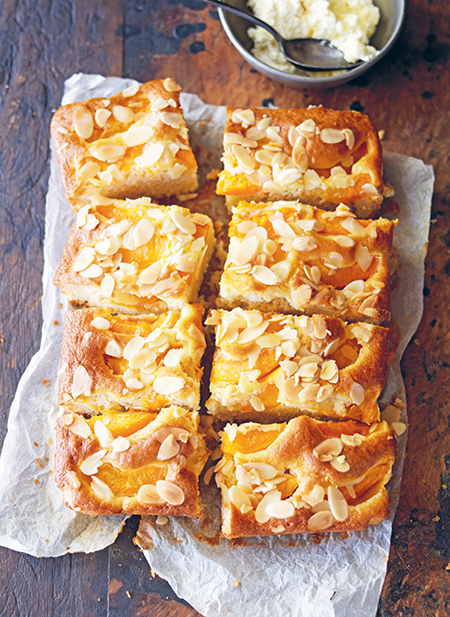APRICOT AND OLIVE OIL CAKE
APRICOT AND OLIVE OIL CAKE
Olive oil is commonly used instead of butter in central and southern Italy, even in the baking of cakes and sweet pastries. It imparts a subtle touch of savoury, but also adds lightness to cake batters. However, the real secret to the ineffable fluffiness of this cake is that the sugar is first dissolved in warm milk and infused with lemon and vanilla. The apricots add a welcome touch of tangy tartness, making this cake impossible to resist for morning or afternoon tea.
Serves 8
-
170 g caster sugar
230 ml milk
finely grated zest of 1 lemon
1 vanilla bean, split and seeds scraped
100 ml extra virgin olive oil
3 teaspoons mistrà or sambuca (optional; see Note)
2 eggs, lightly beaten
1 1/3cups (200 g) self-raising flour
1/2 teaspoon bicarbonate of soda
7–8 apricots, cut into quarters
flaked almonds, for sprinkling
fresh ricotta and honey, to serve (optional)
Directions
-
Preheat your oven to 180°C (160°C fan-forced). Grease and flour a 27 cm x 21 cm rectangular or 21 cm square cake tin (or line it with baking paper).
-
Place the sugar, milk and lemon zest in a medium saucepan over low heat and cook for 3–4 minutes, stirring regularly, until the sugar has dissolved. Do not let the milk come to the boil. Turn off the heat and stir in the vanilla seeds, olive oil and liqueur (if using), then let the mixture cool for 5–10 minutes.
-
Add the beaten egg, flour and bicarbonate of soda and whisk to form a smooth batter. Pour the batter into the prepared tin and arrange the apricot quarters on top any way you like. Sprinkle with the flaked almonds and bake for 30–35 minutes or until pale golden and a skewer inserted into the middle of the cake comes out clean. Cool in the tin for a few minutes, then turn out onto a wire rack and cool at room temperature for 1 hour before cutting. Serve just as it is or with honeydrizzled ricotta.
-
Mistrà is an aniseed-scented liqueur often enjoyed in Marche. For an alcohol-free version, replace the liqueur with milk.
-
If you are using very small apricots, they may plummet to the bottom of the tin during baking. To avoid this, make a double layer of apricot quarters.

